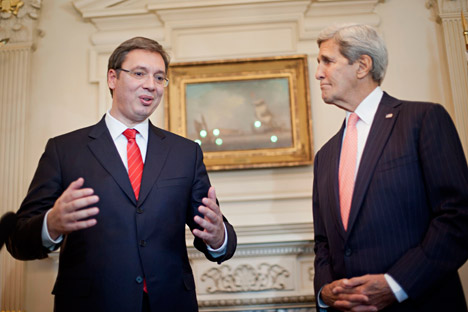
Secretary of State John Kerry listens to Serbian Prime Minister Aleksander Vucic speak to members of the media during their meeting at the State Department in Washington, Wednesday, Sept. 16, 2015. Source: AP
APBelgrade is ready to become a reliable partner of the United States, Serbian Prime Minister Aleksandar Vučić said in talks with U.S. Secretary of State John Kerry, at the same time stressing that he recognizes the territorial integrity of Ukraine, reports the online publication Vzglyad.
However, when asked why Belgrade does not support the European Union's sanctions policy against Russia, although it wishes to join the EU, Vučić replied: "We need to sell our goods, we need to make money." Serbia does not receive financial subsidies from the EU, he added.
According to experts, Belgrade is trying to use its border position to benefit from both sides.
"Pro-Russian president Nikolić has a very energetic, young pro-Western prime minister, Vučić, who is trying to maneuver between the various political forces in Serbia and in Europe. As a rule, with such policies, Belgrade is making important strides in the economic sphere," said political analyst Yevgeny Krutikov.
"Kerry's objective is to prevent strategic contracts between Belgrade and Moscow in the energy sector," he said.
"The U.S. believes that the dependence of Serbia on Russian gas and electricity is even stronger than it really is. But it [the U.S.] will not get these concessions from Serbia, because it cannot deliver gas to Belgrade on tankers. However, Serbia can get small preferences for itself. The Serbs are trying to play on their border location and receive something from it."
The U.S. authorities are trying to restore the work of the American Cultural Center in Moscow, which was closed recently. The centrist daily Nezavisimaya Gazeta reports that the U.S. Embassy sees the move as an attempt by the Russian authorities to isolate Russians from the rest of the world.
However, experts see the situation as a return to the rhetoric of the Cold War.
"These latest unilateral steps further call into question the Russian government's commitment to maintaining people-to-people ties between the Russian and American people," William Stevens, the press attaché of the Embassy of U.S. to Russia, told Nezavisimaya Gazeta.
He recalled that the last three years saw the closing of 29 Russian branches of U.S. centers, where Russians could gain access to information about American culture and politics.
According to Alexei Makarkin, the first vice-president of the Center for Political Technologies, this issue – for the first time since the Soviet era – is ideological.
"If earlier the presence of foreigners in the Russian intellectual system was considered as a benefit, now it is seen as a threat that the scientists who work with them may contract the wrong ideas and became too sympathetic to the West," he said.
Makarkin is confident that Russia wants to preserve the technical part, so that people should continue to study the language and books should keep coming. But at the same time it wants to control the ideological component – that is, to make the Americans lose real influence on this center.
"But for the Americans, both components are important; they consider such projects as centers for the promotion of democracy," he says.
The U.S. Federal Reserve has decided to keep its key rate unchanged at 0-0.25 percent. This decision will support the ruble and oil prices, the news website Gazeta.ru writes.
This is good news for the Russian ruble and the currencies of other raw-material producing countries, since it postpones another round of the strengthening of the dollar and the acceleration of capital flight, say experts.
In the first hour after the news broke, the ruble rose against the dollar on the Russian exchange, reaching 65 rubles per dollar. The U.S. currency also dropped against six major currencies, including the euro.
"Due to the news that the Fed did not raise rates, oil prices will pass the $50-a-barrel level and are very likely, in the short term, to reach $60," Sergei Pigaryov, senior analyst at Rye, Man & Gor Securities, predicts.
"The recent decline in oil prices was mainly due to expectations about the Fed's decision, and the drop will now be fixed," he said.
All rights reserved by Rossiyskaya Gazeta.
Subscribe
to our newsletter!
Get the week's best stories straight to your inbox